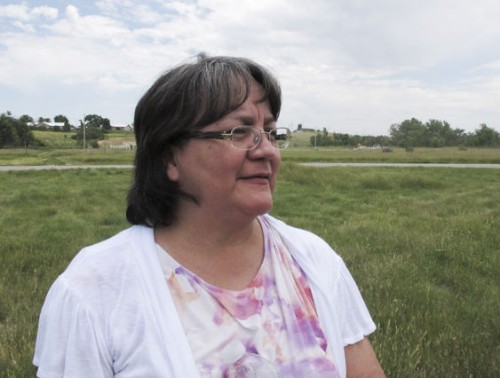
By NORA HERTEL Associated Press
PINE RIDGE, South Dakota — Denise Mesteth signed up for new health insurance through the federal Affordable Care Act, despite concerns that it may not be worth the money for her and other Native Americans who otherwise rely on free government coverage.
Mesteth, who has a heart murmur and requires medication and regular blood work, said she’s cautiously optimistic that the federal insurance will be superior to what she has now. Many other American Indians have been more reluctant to enroll, choosing instead to continue relying on the Indian Health Service for their coverage and taking advantage of a clause in the federal health reform law that allows them to be exempt from the insurance mandate if they meet certain requirements.
“If it’s better services, then I’m OK,” Masteth said of ACA. “But it better be better.”
Mesteth and other American Indians in South Dakota account for 2.5 percent of the people in the state who have signed up for insurance under the federal health care law, according to the latest signup numbers. The state, with nearly 9 percent of its overall population Native American, ranks third for the percentage of enrollees who are American Indian among U.S. states using the federal marketplace.
The Great Plains Tribal Chairmen’s Health Board, which provides support and health care advocacy to tribes, received $264,000 to help Native Americans in South Dakota navigate the new insurance marketplace.
Tinka Duran, program coordinator for the board, said people are primarily concerned about the costs of enrolling. Insurance is a new concept to most because health care has always been free, she said.
“There’s a learning curve for figuring out co-pays and deductibles,” she said.
During a U.S. Senate Indian Affairs Committee hearing in May, tribal leaders chastised IHS as a bloated bureaucracy unable to fulfill its core duty of providing health care for more than 2 million Native Americans and Alaska Natives. IHS acting director Yvette Roubideaux said changes were underway but that more money will be needed than the $4.4 billion the agency receives each year.
She noted that federal health care spending on Native Americans lags far behind spending on other groups such as federal employees, who receive almost twice as much on a per-capita basis. Meanwhile, American Indians suffer from higher rates of substance abuse, assault, diabetes and a slew of other ailments compared to most of the population.
Native Americans and Alaska Natives are exempt from the health insurance mandate if they meet certain requirements. ACA also permanently reauthorized the Indian Health Care Improvement Act and authorized new programs for IHS, which also is starting to get funds from the Veterans Affairs Department to help native veterans.
When American Indians do obtain insurance, it means fewer people are tapping the IHS budget, said Raho Ortiz, director of the IHS Division of Business Office Enhancement.
“If more of our patients have health insurance or are enrolled in Medicaid, this means that more resources are available locally for all of our patients,” Ortiz said in an emailed statement. “This, in turn, allows scarce resources to be stretched further.”
Those who sign up for federal health care can still use IHS facilities but have the option of seeking health care elsewhere, Ortiz said.
State Democratic Sen. Jim Bradford is among the skeptics. The Oglala Sioux member lives on the Pine Ridge reservation, home to two of the poorest counties in the nation.
The U.S. government provides health care to Native Americans as part of its trust responsibility to tribes that gave up their land when the country was being formed. Bradford and others object to the shift in health care providers on the principle that IHS is obligated by treaty to supply that care.
Harriett Jennesse, a member of the Lower Brule Sioux Tribe who lives in Rapid City, said she already has seen the benefits of the new health insurance and doesn’t mind paying a little out of pocket.
Jennesse said she put off treatment for a painful bone chip in her elbow after IHS denied a doctor’s referral to a specialist on grounds that it wasn’t an urgent enough need. She’s now seeing a specialist for dislocation in her other elbow and will also try to get the bone chip fixed when the other arm heals.
